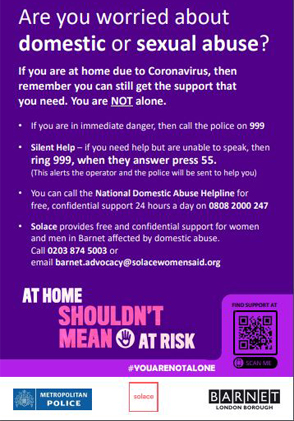N.B should you need to delete your browser history immediately after viewing this page, check out this guidance on how to automatically delete chrome history after closing
For anyone who feels they are at risk of abuse, it is important to remember that there is help and support available to you. Guidance is also available to help perpetrators change their behaviour.
The government supports and funds a number of charities who are able to provide advice and guidance and we are in regular contact with the charity sector and the police to ensure that these support services remain open during this challenging time.
We recognise that domestic abuse is a widespread problem that can affect victims both physically and mentally. It is not restricted to purely impacting on an individual’s personal life.
We are committed to highlighting the support that is available to those that are experiencing or have experienced domestic abuse.
SafeLives, a charity dedicated to ending domestic abuse, have put together a safety planning guide PDF, 194.48 KB which summarises some tips, advice and support.
Domestic abuse is more than physical violence. It can also include, but is not limited to:
 If you believe you are being abused, or worried you may commit domestic abuse, please use the following services which can help you.
If you believe you are being abused, or worried you may commit domestic abuse, please use the following services which can help you.
We know that you may be experiencing some form of physical or psychological domestic abuse while self-isolating.
Every effort should be made to contact the Police and national charities that can provide wide-ranging support. In emergencies, we can arrange swift access to a safe space if necessary; contact Care and Concern for confidential help.
If you suspect that your neighbours or those in your community are victims of domestic abuse, we encourage you to report it to the police.
You can report a crime by calling 101 or anonymously report a crime by calling crime stoppers on 0800 555 111.
If you are concerned about another student, please contact Care and Concern.
If you are in immediate danger, call 999 and ask for the police - the police will continue to respond to emergency calls
If you are in danger and unable to talk on the phone, call 999 and then press 55. This will transfer your call to the relevant police force who will assist you without you having to speak.
If calling from a mobile: If prompted, press 55 to Make Yourself Heard and this will transfer your call to the police. Pressing 55 only works on mobiles and does not allow police to track your location.
If calling from a landline: If only background noise can be heard and operators cannot decide whether an emergency service is needed, then you will be connected to a police call handler.
If you replace the handset, the landline may remain connected for 45 seconds in case you pick up again.
More information about the Silent solution system.
When 999 calls are made from landlines, information about your location should be automatically available to the call handlers to help provide a response.
Women’s Aid has provided additional advice specifically designed for the current coronavirus outbreak, including a live chat service.
The Men’s Advice Line is a confidential helpline for male victims of domestic abuse and those supporting them. It can be contacted on 0808 801 0327.
The National Domestic Abuse Helpline website provides guidance and support for potential victims, as well as those who are worried about friends and loved ones. They can also be called, for free and in confidence, 24 hours a day on 0808 2000 247. The website also has a form through which women can book a safe time for a call from the team.
If you are concerned about how coronavirus may affect your finances and leave you vulnerable to economic abuse, please see the advice provided by HM Treasury on what support is on offer. The charity Surviving Economic Abuse has also provided additional guidance and support.
Hestia provides a free-to-download mobile app, Bright Sky, which provides support and information to anyone who may be in an abusive relationship or those concerned about someone they know.
SafeLives is providing guidance and support to professionals and those working in the domestic abuse sector, as well as additional advice for those at risk.
If you are worried about hurting the ones you love while staying at home, call the Respect Phoneline for support and help to manage your behaviour, 0808 802 4040.
Chayn provides online help and resources in a number of languages, ranging from identifying manipulative situations and how friends can support those being abused.
For women and children in London, Solace provides online and telephone support and advice. They also can help with safe refuge for those of need.
The app that provides enhanced levels of protection. Some of the features include - notifying your chosen contacts your location and sending audio/video evidence directly to their mobile phones.
For more advice and guidance on domestic abuse, please see Domestic abuse: how to get help.